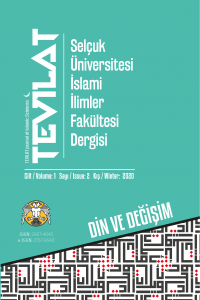Abstract
İslâm yedisinde ne ise yetmişinde de o olacak şekilde asla değişmeyen bir öze ve o özü ayakta tutacak birtakım şerî‘ itikadî, amelî ve ahlâkî kurumlara ve onlarla ilgili ahkâma sahiptir. Ancak hayatiyetinin sürdürülebilmesi için de vücuttaki hücrelerin sürekli yenilenmesi gibi kurumların yenilenmeye (tecdid) ihtiyacı vardır. Bu iki özellik bir arada tutulamadığı zaman İslâm hukuku ya tamamen başkalaşır ve artık ona İslâm hukuku denemez ya da donuklaşır ve hayata koşut varlığını sürdüremez, hayatın dışına itilir ve işlevsiz kalır.
References
- Akgündüz, Ahmet. Osmanlı Kanunnâmeleri ve Hukukî Tahlilleri 3. Kitap Yavuz Sultan Selim Devri Kanunnâmeleri. İstanbul: FEY Vakfı Yayınları, 1991.
- Ebû Yûsuf, Yakûb b. İbrâhîm. Kitâbu’l-harâc. Beyrût: Dâru’l-Maʿrife, 1979.
- Ebû Zehra, Muhammed. Mâlik hayâtuhu ve asâruhu ve âruâuhu’l-fıkhıyye. Egypt: Matbaatu’l-İ’tisâm, n.d.
- Erdoğan, Mehmet. İslâm Hukukunda Ahkâmın Değişmesi. İstanbul: MÜ İlâhiyat Fakültesi Vakfı Yayınları, 10th edition, 2017. Erdoğan, Mehmet. "Teşrî ve Hz. Peygamber’in / Sünnetin Dindeki Yeri", Kuran ve Sünnet İlişkisi Kur'an’da Risalet ve Sünnetin Teşrîi Değeri. İstanbul: Kuramer, 2020.
- Erdoğan, Mehmet. "İslâm Hukukuna Göre Şeriat Nedir Ne Değildir?". Şeriat Nedir Ne Değildir. ed. Adnan Demircan. Ankara: Fecr Yayınları, 1st edition, 2019.
- İbn Kayyim el-Cevziyye, Ebû Abdillâh Şemsüddîn Muhammed b. Ebî Bekr b. Eyyûb ez-Züraî. et-Turuku’l-hükmiyye. Dımeşk: Mektebetü Dâru’l-Beyân, n.d.
- İbn Sa’d, Muhammed b. Abdullah. et-Tabakâtü’l-kübrâ (Mütemmimü’s-sahâbe et-tabakatü’l-hâmise). Critical ed. Muhammed b. Sâmil es-Sülemî. Tâif: Mektebetü’s-Sıddîk, 1st edition, 1414/1993.
- İbn Teymiyye, Ebü’l-Abbâs Takıyyüddîn Ahmed b. Abdilhalîm b. Mecdiddîn Abdisselâm el-Harrânî. Evliyâu’r-Rahmân ve evliyâu’ş-Şeytân. Dımeşk: Mektebetü Dâru’l-Beyân, 1985.
- İbn Teymiyye, Ebü’l-Abbâs Takıyyüddîn Ahmed b. Abdilhalîm b. Mecdiddîn Abdisselâm el-Harrânî. Mecmûu’l-fetâvâ. Medine: Mecmeu Melik Fehd, 1995.
- Commission. “İrs”. el-Mevsûatü’l-fıkhiyyetü’l-kuveytiyye. el-Kuveyt: Vizâratu’l-Evkâf ve’ş-Şuûni’l-İslâmiyye, 1983.
- Şâtıbî, Ebû İshak İbrahîm b. Mûsâ. el-Muvâfakât İslâmî İlimler Metodolojisi. trans. Mehmet Erdoğan. İstanbul, 5th edition, 2015.
- Şevkânî, Muhammed b. Ali el-Yemenî. Fethu’l-kadîr. 6 vol. Dımeşk: Dârü İbn Kesîr-Beyrut: Dârü’l-Kelimi’t-Tayyib, 1st edition, 1414.
Abstract
The essence of Islam is changeless, and there are religious, practical and moral institutions that keep this essence standing, as well as provisions regarding these institutions. However, in order to ensure its vitality, its institutions are in need of constant renewal (tajdid), just as how cells in the human body regenerate over time. When these two features cannot be sustained together, either the Islamic law will completely metamorphose in a way that it cannot be called Islamic law anymore or it will become frozen and cannot exist in parallel to life, which will cause it to be pushed left out of life and be functionless. The survival of the completed Islamic sharia until the end of days will be ensured by the ulema. What is expected from the ulema is to fulfil this responsibility personally.
References
- Akgündüz, Ahmet. Osmanlı Kanunnâmeleri ve Hukukî Tahlilleri 3. Kitap Yavuz Sultan Selim Devri Kanunnâmeleri. İstanbul: FEY Vakfı Yayınları, 1991.
- Ebû Yûsuf, Yakûb b. İbrâhîm. Kitâbu’l-harâc. Beyrût: Dâru’l-Maʿrife, 1979.
- Ebû Zehra, Muhammed. Mâlik hayâtuhu ve asâruhu ve âruâuhu’l-fıkhıyye. Egypt: Matbaatu’l-İ’tisâm, n.d.
- Erdoğan, Mehmet. İslâm Hukukunda Ahkâmın Değişmesi. İstanbul: MÜ İlâhiyat Fakültesi Vakfı Yayınları, 10th edition, 2017. Erdoğan, Mehmet. "Teşrî ve Hz. Peygamber’in / Sünnetin Dindeki Yeri", Kuran ve Sünnet İlişkisi Kur'an’da Risalet ve Sünnetin Teşrîi Değeri. İstanbul: Kuramer, 2020.
- Erdoğan, Mehmet. "İslâm Hukukuna Göre Şeriat Nedir Ne Değildir?". Şeriat Nedir Ne Değildir. ed. Adnan Demircan. Ankara: Fecr Yayınları, 1st edition, 2019.
- İbn Kayyim el-Cevziyye, Ebû Abdillâh Şemsüddîn Muhammed b. Ebî Bekr b. Eyyûb ez-Züraî. et-Turuku’l-hükmiyye. Dımeşk: Mektebetü Dâru’l-Beyân, n.d.
- İbn Sa’d, Muhammed b. Abdullah. et-Tabakâtü’l-kübrâ (Mütemmimü’s-sahâbe et-tabakatü’l-hâmise). Critical ed. Muhammed b. Sâmil es-Sülemî. Tâif: Mektebetü’s-Sıddîk, 1st edition, 1414/1993.
- İbn Teymiyye, Ebü’l-Abbâs Takıyyüddîn Ahmed b. Abdilhalîm b. Mecdiddîn Abdisselâm el-Harrânî. Evliyâu’r-Rahmân ve evliyâu’ş-Şeytân. Dımeşk: Mektebetü Dâru’l-Beyân, 1985.
- İbn Teymiyye, Ebü’l-Abbâs Takıyyüddîn Ahmed b. Abdilhalîm b. Mecdiddîn Abdisselâm el-Harrânî. Mecmûu’l-fetâvâ. Medine: Mecmeu Melik Fehd, 1995.
- Commission. “İrs”. el-Mevsûatü’l-fıkhiyyetü’l-kuveytiyye. el-Kuveyt: Vizâratu’l-Evkâf ve’ş-Şuûni’l-İslâmiyye, 1983.
- Şâtıbî, Ebû İshak İbrahîm b. Mûsâ. el-Muvâfakât İslâmî İlimler Metodolojisi. trans. Mehmet Erdoğan. İstanbul, 5th edition, 2015.
- Şevkânî, Muhammed b. Ali el-Yemenî. Fethu’l-kadîr. 6 vol. Dımeşk: Dârü İbn Kesîr-Beyrut: Dârü’l-Kelimi’t-Tayyib, 1st edition, 1414.
Details
| Primary Language | English |
|---|---|
| Subjects | Religion, Society and Culture Studies |
| Journal Section | Translated Articles |
| Translators | |
| Publication Date | December 31, 2020 |
| Published in Issue | Year 2020 Volume: 1 Issue: 2 |
TEVILAT is licensed under a Creative Commons Attribution-NonCommercial 4.0 International License (CC BY NC).


